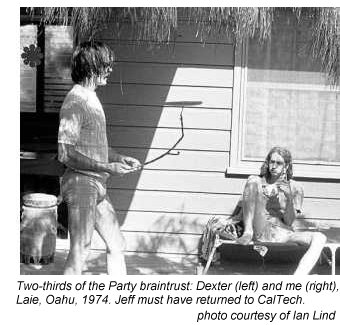

|
| weblog/wEssays archives | home | |
|
I Am a Member of an Absurd Elite (November 7, 2006)  What elite do I have the honor of belonging to, and why is it absurd? The elite is
those Americans who vote, and it is absurd because it is an elite not of privilege but
one granted by the passivity of non-voters.
What elite do I have the honor of belonging to, and why is it absurd? The elite is
those Americans who vote, and it is absurd because it is an elite not of privilege but
one granted by the passivity of non-voters.
Exit polls suggest that the segment of the population with the highest voter turnout is Caucasian citizens over the age of 50. Since I am Haole and 52 years of age, I belong to this elite: "Baby Boomer and up" white folks who vote. The lowest voter turnouts as a percentage of eligible voters tends to be young people of all ethnicities. From the point of view of someone who proudly voted at age 18 in 1972 (for McGovern) and in every election since, this is an intolerable abandonment of political power. But voting is just like eating vegetables or donating time to the community or any other activity which is not enforced: no one makes you do it. As a carpenter, I worked with a great number of blue-collar guys over the years. Most did not vote, stating lame old cliches like "don't vote, it only encourages them" or "it doesn't make any difference who wins" to justify their lethargy. But it does matter, and I can point to an issue which is entirely political in nature yet impacts every American: healthcare. I don't want to get into the debate at this point, but even if you disagree as a matter of policy with a National healthcare system akin to Japan's, anyone willing to deal with facts and not ideology is appalled by the waste (30% thrown away on paper shuffling), gross incompetence (needless procedures, horrendous malpractice expenses) and sheer injustice (46 million with no insurance whatsoever, emergency rooms shutting down, bankrupted by the costs of treating the uninsured, etc. etc. etc.) It is a fact that we as a nation spend more per capita than any industrialized nation on healthcare but are far less healthy in terms of chronic diseases like diabetes. (Speaking of Japan: Have you heard any talk about how that national healthcare system is poised to bankrupt that nation of rapidly ageing citizens? Why not? Could their system be much more efficient and less costly than ours?) The solution to our healthcare fiasco is political, and the shape of that eventual solution depends on who controls Congress. Yes, yes, it's often a matter of whose special interests are better represented, but if the citizenry kicked out the current raft of bums and then did so again two years hence if they came up with a healthcare plan which served the trial lawyers, HMOs, hospital corporations and the AMA, the politicians would get the message: quit jerking around and get it done. But if nobody votes them out on their plump duffs, then it's "business as usual." It wasn't always this way. In the past, most citizens voted. Read this feature from the October 16 Wall Street Journal for more: Why Don't Americans Like to Vote? Politics Are Only One Reason If you're an American who is not planning to vote Nov. 7, join the crowd. In the past few decades, less than 40% of eligible voters in the U.S. have bothered to cast ballots in midterm elections.What's the connection between Election Day and the photo above? It's my personal history anecdote showing the power of even a few thousand votes. I was once one of the Triumvrate of The People's Party of Hawaii, a third party which sprang gloriously to life in the early 70s in Hawaii, along with a bumper crop of other off-beat splinter parties. (The Triumvrate was Jeff Blair, Dexter Cate and myself. Ken Ellingwood and Tony Hodges added their considerable talents in 1976.) In 1974, our candidate for U.S. Senate was every conservative's nightmare: a wild-bearded hippie who literally worshipped marijuana, going to court to win the right to use marijuana in his religious ceremonies (Unsurprisingly, he lost. Alas; it would have become a very popular religion.) The Republicans, roiled by the Watergate scandal, didn't even dredge up a candidate to oppose Senator Dan Inouye. So they voted for our guy, the wild-bearded hippie. We received, as I recall, over 40,000 votes. Though this was not enough to send Mr. Kimmel to the Senate, as 10% or more of the votes cast, it did maintain our legal status as a registered political party, which meant we didn't have to collect thousands of signatures to run a slate of candidates in 1976. And as a result, we were empowered to bring new ideas and candidates to the voters. Those votes for the People's Party candidate mattered. Look at this photo of our weekend braintrust meeting. Eat your sclerotic little heart out, Karl Rove! It's true: third parties have more fun. I predict national healthcare will finally be addressed when middle-class voters start getting their healthcare in the overcrowded emergency rooms along with the poor folks. In the meantime: heads up, young people. If you give up your political power so easily, expect to be ignored. You "voted" to be ignored whether you realized it or not. For more on this subject and a wide array of other topics, please visit my weblog. copyright © 2006 Charles Hugh Smith. All rights reserved in all media. I would be honored if you linked this wEssay to your site, or printed a copy for your own use. |
||
| weblog/wEssays | home |